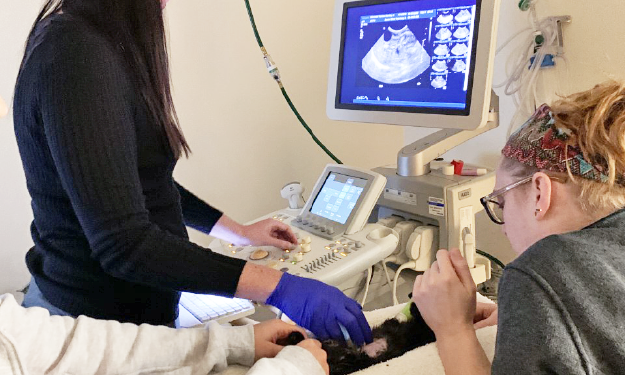Ultrasound for Cats & Dogs

Since dogs and cats cannot tell us what they are feeling, veterinarians rely upon many of the same testing modalities that are used in people to help characterize your pet’s problems and to help provide a diagnosis. An ultrasound may be recommended to get images of your pet’s internal organs.
It does not use x-rays, a form of ionizing radiation, to acquire the images. Thus, it is safer for the patient and non-invasive.
Ultrasound can be done of the abdomen, heart, eye, tendons, and in some circumstances, the chest. Abdominal ultrasounds will be the focus of this article.
How Does an Ultrasound Work?
Ultrasonography is a diagnostic tool that uses ultrasonic (sound) waves. A transducer is placed on the abdomen which sends sound waves through the abdominal cavity. These sound waves can be absorbed, reflected, or completely pass through tissues. The tranducer then detects which sound waves are bounced back to it resulting in an image on a screen. These images give us a black, white, and grey image. These images can show changes on the surface or the interior of an organ. Sounds waves cannot pass through air/gas or bone.
What Pets Can Benefit from an Ultrasound?
Ultrasound is frequently used to evaluate the abdomen, including:
- Liver disease
- Splenic masses
- Gastrointestinal tract – e.g. Foreign body obstruction, tumors
- Urinary bladder – e.g. Stones
- Kidney disease
Ultrasound can also be used to evaluate other parts of the body including the chest, tendons, and salivary glands, and to guide biopsies or needle aspirates.
What Will an Ultrasound Tell Us About Your Pet?
An ultrasound may be recommended to look for a mass detected during examination, to evaluate an organ when blood work results indicate an abnormality, if fluid is detected in the abdomen, if there is unexplained weight loss, unexplained vomiting/diarrhea, or if an intestinal foreign body obstruction is suspected. Ultrasound is also used to allow guided sampling of organs, masses/nodules, urine, and fluid.
What to Expect for My Pet’s Ultrasound
If your pet is going to have an ultrasound, it is likely that you will be asked to refrain from feeding your pet that day until after the ultrasound. This increases the chance of having good images to interpret. It is also advisable to not let your pet urinate on the way into the clinic before the ultrasound, especially if a urinary tract abnormality is present or suspected.
Almost all pets need to have the fur on their bellies clipped to allow for good ultrasound images to be obtained. Most pets do not require sedation for an ultrasound and simply lay on their backs in a soft, padded trough. A skilled veterinary technician will keep your pet comfortable with pats and massages to make the process as non-stressful as possible. However, there are dogs and cats that are not amenable to this either due to severe anxiety or fractious behavior. During those times, sedation is often best for the pet and for the veterinary staff.
Even a normal ultrasound has value – it can rule out a number of conditions and give you peace of mind that your pet’s insides are as healthy as the outsides. If you have questions about ultrasounds or need to make an appointment for any reason, select the nearest Ethos hospital with an Ultrasound and give us a call!